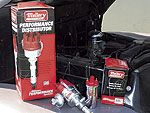
These days, the performance aftermarket has equipped enthusiasts with the ease of adapting modern drivetrains to their vintage mobiles. As of late, you can even "revert" an LS1 from electronic fuel injection to normal aspiration, or throw an electronic overdrive transmission in place of an old three-speed. Yep, all kinds of neat stuff for the modern stuff. But what about neat new stuff for the not-so-new stuff? There are folks who would rather not have their old trucks look/perform nearly like their new trucks, and so all this new fangled "stuff" is of no use. That does not mean the relics are relegated to simply using old stuff, though, as you are about to see.
As many companies are working overtime to develop new products for late-model applications, there are people who have kept their feelers on the past, too. When it comes to the venerable Chevy inliners, though there isn't a host of available performance goodies, Stovebolt enthusiasts aren't always stuck with antique equipment. Mallory knows that not everyone runs a small-block Chevy, and not everyone wants an HEI ignition, either. With that in mind, they have developed a "custom order" service for people like us--people with old engines who could use the same hot, efficient spark that Mallory distributors provide for everyone else. In this case, the situation called for a vacuum advance electronic distributor for the early 235ci inline-six. "But the early inliners already came with vacuum advance distributors," you say? Of course they did, but they're also external advance in that the whole distributor moves, not just an internal breaker plate. For low usage applications, the stock Delco centrifugal-vacuum advance is actually fine, but some trucks don't fit that category.
Thanks to Mallory's "custom" option, we were able to obtain an "adjustable" vacuum advance UniLite for our 235ci L6--the beloved Loadmaster. In the past, most thought only a non-vacuum advance and a dual-point were only available from Mallory for the 235; not anymore. While in theory it is thought to be the same as the factory Delco points unit, the UniLite is actually worlds apart. For starters, in place of ancient points, the distributor is triggered by Mallory design photo-optic infrared LED system. Along with the vacuum advance's adjustability, the unit's billet housing, and the patented UniLite design, the electronic ignition provides improved combustion efficiency and economy, increased spark plug life, better cold weather starting, and maintenance-free operation; that last part was a seller for us! Along with a canister-style coil--the cool one with the vintage Mallory logo--we were set to upgrade the 235's worn-out ignition system, which had recently come down with a bad case of broken vacuum advance and burned-up coil.
Since we'd be "beautifying" the engine with a fancy new dizzy and coil, it seemed like the perfect opportunity to add a little more flare, as well. Of course, we're talking about the one and only Wayne set from Patrick's Antique Cars & Trucks--the mandatory finned and polished aluminum rocker and pushrod covers that give the old inliners that just-right, nostalgic racey look. Just as we put our order in with Patrick's, we became privy to another must-have finned accessory, one with just as much function as form. Astro Coil's new line of finned nostalgia ignition coils is definitely the hot ticket, and unlike a typical coil cover, these units perform up to par with the Mallory UniLite, (we made sure and checked with Mallory techs before causing any damage).
The installation is purely straightforward--and we're talking about the entire job, from mechanicals to beautification. The UniLite is a direct drop-in replacement; the Wayne covers work on early and late 235s, thanks to a provided stud kit from Partick's; and the coil, well, it's a coil--a few wires and a couple of nuts. You'll notice that a ballast resistor was wired into the system; we found out that even though the Mallory directions indicated the necessity, it wasn't all that necessary with the electronic ignition. Nevertheless, no harm was done, nor was the performance affected.